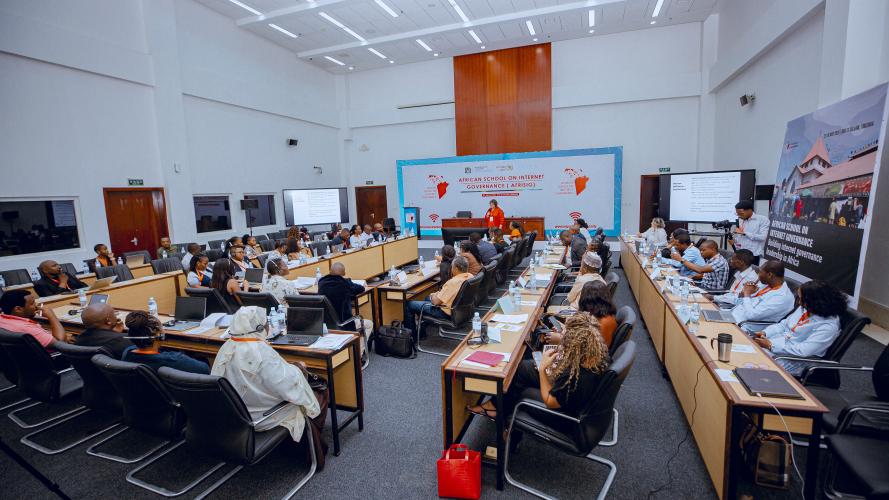
The 13th African School on Internet Governance (AfriSIG) kicked off at 7:00 pm Tanzanian time on 23 May 2025 with a stylish round of self-introductions by fellows and faculty members from 13 African countries. Over the years, the school has built a solid reputation for producing future advocates of multistakeholder internet governance and for strengthening their capacity across various dimensions of the digital space.
“At the African School on Internet Governance, we choose empowerment and inclusion for all Africans to learn, aspire and act,” said Nkundwe Mwasaga, the director general of the ICT Commission of the United Republic of Tanzania. His words captured the spirit of the gathering, which served as both a training ground and launchpad for collaborative action.
For fellows, AfriSIG is not just an educational platform; it is a space for collaboration, cooperation, alliance building, and preparation for what lies ahead. It is where young African professionals learn the skills of negotiation, compromise and finding common ground in the ever-evolving world of internet governance.
Beyond the intensive lectures and rich interactions, Dar es Salaam added a unique dimension to the experience. Quiet, serene, welcoming and deeply African in its charm, the city embraced us all. Nights were filled with long walks, food and deep conversations with fellow participants. The atmosphere was both relaxing and enriching – Dar es Salaam, indeed, is the perfect expression of African beauty.
Internet governance
One of the most intellectually stimulating aspects of the school was the practicum session. In this exercise, fellows were divided into five groups and tasked with developing or proposing policy inputs to be submitted to the Chair of the United Nations Commission on Science and Technology for Development (CSTD). For me, it was a moment of revelation – a rare opportunity to engage directly with the processes that shape global internet governance.
Each fellow was encouraged to join a group outside their immediate area of work and assume a fictional role representing a stakeholder sector. The sectors included government and inter-governmental institutions, business, civil society, the tech community and parliament. I was assigned the role of the minister of communication and digital economy of the United Republic of Tanzania. As an activist and media practitioner, stepping into the shoes of a government official – people who often claim to act in the interest of the state – was no small feat. Yet it gave me a unique perspective on how such individuals think, justify their actions and make policy decisions.
Knowledge, as they say, is the gateway to everything. However, knowledge can be used for both good and ill. One key takeaway from the session on cybersecurity was the insight that “every crime has a mama, a motive, and a reason behind it.” This statement emphasised the importance of at least a basic understanding of cybersecurity in today’s world. The internet has become inseparable from our lives: we eat, drink, and breathe the internet.
In addition to cybersecurity, fellows were thoroughly groomed on key African frameworks and initiatives around data and AI governance. Discussions covered a broad range of regional instruments, including the Malabo Convention, the African Union’s Digital Transformation Strategy, the AU Data Policy Framework, and ACHPR 2024, which promote data access as a tool for advancing human rights and sustainable development in the digital age. We also examined the African Continental Free Trade Area (AfCFTA), the Continental AI Strategy on governing data for AI, and the Data Governance in Africa initiative supported by GIZ and the EU.
AfriSIG is not only about technical training and intellectual discourse. Discussions on the role of governments in multistakeholder internet governance remain a priority of the school. As emphasised by several stakeholders present, achieving meaningful progress in digital governance is not possible without the active involvement of governments.
To paraphrase one South African fellow, “When you are in Tanzania, you feel Africa.” That feeling was deeply shared among us all.
Asanteni sana Watanzania, tutaonana hivi karibuni [Thank you very much Tanzanian, see you soon].
Ali Sabo is a digital rights advocate and works with the Centre for Information Technology and Development (CITAD) as its digital rights officer.
The 13th annual African School on Internet Governance (AfriSIG) took place from 23 to 28 May 2025 in Dar es Salaam, Tanzania, and was convened by the Association for Progressive Communications (APC), the African Union Commission’s Information Society Division, and Research ICT Africa (RIA), in collaboration with UNECA and the UN IGF Parliamentary Track.
